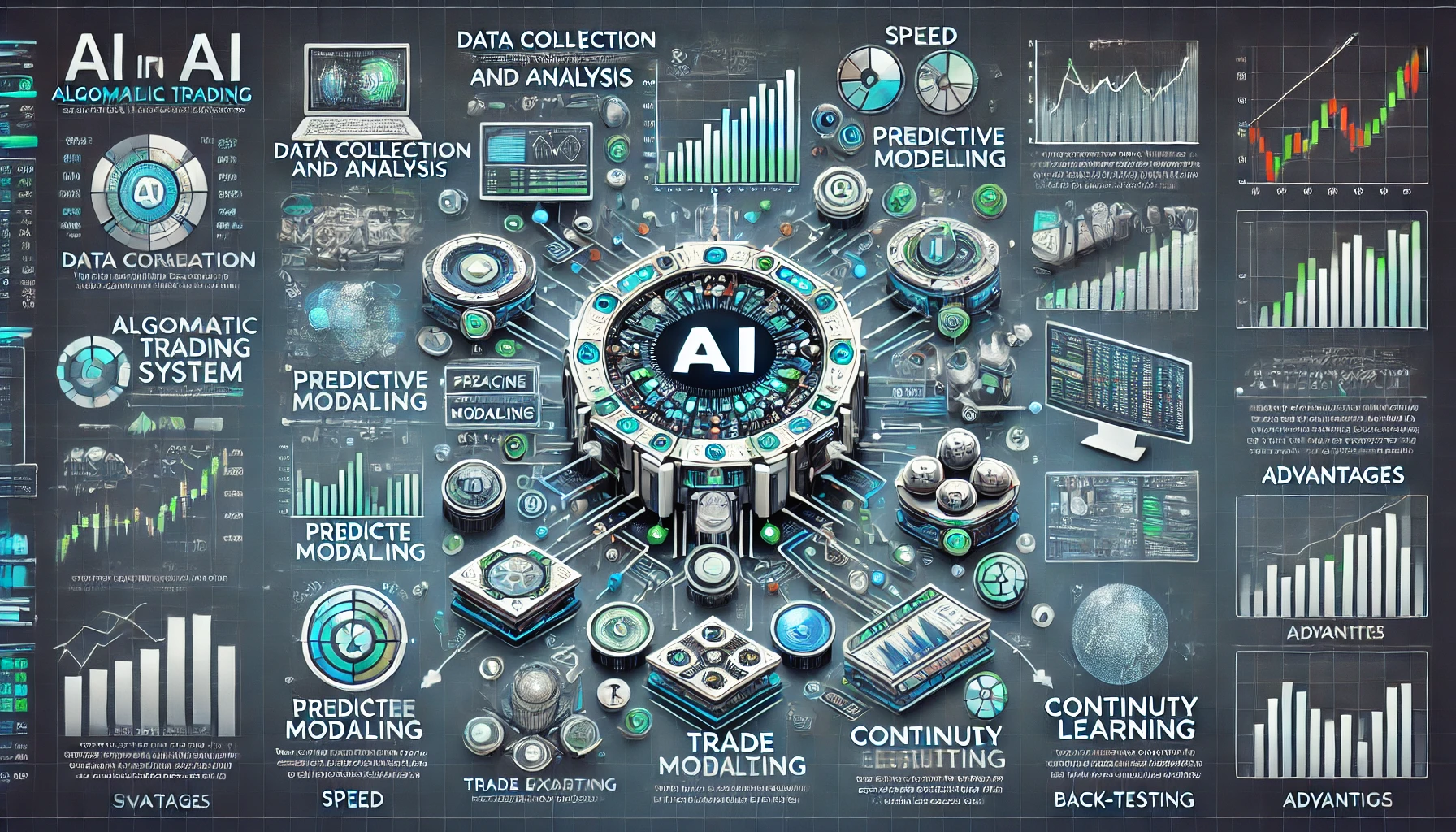The Role of AI Agents in Modern Algorithmic Trading: Transforming the Future of Finance
The finance world is always changing, and AI is bringing many of them. One particular shift that has people excited is the adoption of AI for algorithmic trading. AI makes traders work more quickly, smartly, and efficiently.
Let’s examine how AI changes algorithmic trading, the advantages it brings, and how this is changing the future of financial markets.
Covered Contents
ToggleWhat is Algorithmic Trading?
Algorithmic trading refers to automatic trading decisions from computer programs, which analyze the data, track trends, and execute trades themselves. These programs analyze data, spot trends, and execute trades without human input. The latter performs the pre-set instructions for the purchase and selling of any available financial assets—which include stocks, bonds, commodities, and all other possible items for trading—automatically at pre-set times to purchase at the most favorable prices to obtain the smallest opportunities for market imperfections. Human decisions on which traditional strategies are always slow and error-prone. Algorithmic trading, on the other hand, relies on mathematical models and statistical analysis of real-time data for fast, objective decisions.
What are AI agents?
AI agents are systems that use artificial intelligence to make decisions and perform tasks. In trading, these AI agents are designed to analyze vast amounts of data, learn from patterns, and execute trades automatically. They can make decisions based on complex data inputs, including market trends, economic indicators, and news. One key difference in algorithmic trading using AI agents is that algorithms are adaptive rather than instruction-based, unlike the traditional ways. They can learn through experience, improve the performance of actions accordingly, and change their strategies according to the marketing of the market. This helps make AI agents a powerful resource in algorithmic trading.
Curious minds, have you explored this?
Working with AI Agents in Algorithmic Trading
AI agents in algorithmic trading ingest massive streams of data and apply ML algorithms, which enables them to make predictions on future market movements. Here is a simple explanation of how the process works:
Data Collection and Analysis: First, AI agents must collect relevant data. The raw data includes historical price data, trading volumes, financial news, economic reports, and even social media sentiment. The machine can absorb such information much more quickly than a human can, so patterns and trends can easily be indicated and identified quickly.
Predictive Modeling: Once the data is gathered, AI agents employ machine learning algorithms to build predictive models. Predictive models analyze historical data and market patterns to predict future price movements. The agents use several ML techniques, including supervised learning, unsupervised learning, and reinforcement learning, to enhance the precision of their predictions.
Continuous Learning: Another strong feature of an AI agent is its capacity to learn over time. The AI can make better predictions and strategies over time by learning from greater amounts of data and experience. For example, if it notices a trend change in market conditions or anything unusual, then the AI strategy would change to accommodate those aspects.
All these predictions are executed as per their trades by AI agents acting after the agents predict market movements. This allows ordering, setting new prices, and execution in real-time, ensuring the execution at the best possible prices.
Advantages of AI Agents in Algorithmic Trading
There are several key advantages to using AI agents in algorithmic trading:
Speed and Efficiency:
AI agents can process information and execute trades much faster than humans. Speed is paramount in high-frequency trading. AI agents can make thousands of trades per second, capitalizing on tiny price movements that a human trader cannot possibly see.
Accuracy and Precision:
AI agents can analyze enormous volumes of data with an accuracy that is rather challenging for a human to do. They rely on statistical models to predict prices and make decisions based on such data-driven insight rather than emotions and biases. Therefore, it gives the most precise trading decisions possible and is well-informed.
Cost Effectiveness:
Algorithmic Trading driven by AI also saves on the cost of trading. Human traders naturally require salaries and benefits plus several overheads that are included on the account, while an AI agent could do 24×7 and have no break/rest time which indeed makes AI-based agents cut down in real-time overhead as compared with those human trading specialists.
Risk Management:
AI agents are used for the ongoing monitoring of market conditions for adjusting trading strategies. For example, if an asset becomes too volatile, an AI agent will modify its trading strategy on the fly by decreasing any possible losses arising from that asset. Such real-time adaptability reduces risks that might arise from changes in the market.
Back-testing and Optimization:
This is achieved by allowing AI agents to simulate trades based on historical data. This will then enable traders first to test the effectiveness of a strategy before they implement it in real markets. AI agents also optimize their strategies, always refining them based on the incorporation of new data and performance metrics.
Examples of AI Agents in Algorithmic Trading
Many firms and institutions already use AI agents in their trading strategies. Some of these are:
High-frequency trading firms are utilizing AI agents to execute trades in a very large volume in just milliseconds. The firm relies on the AI agent to identify profitable trading opportunities and act on them before the competition can do so. Using AI agents, firms can generate profit from tiny price changes that take place over very short periods.
Robo-Advisors: Robo-advisors are AI-based systems that provide computerized investment advice to individuals. Based on the investment needs of a certain individual, the level of risk tolerance, and so forth, an AI evaluates that input and develops an investment portfolio suggestion that the AI agent automatically manages over time.
Quantitative Hedge Funds: Quantitative hedge funds use AI agents to analyze market data and develop sophisticated trading strategies. These funds rely on advanced statistical models and machine learning algorithms to predict market movements and optimize trading decisions.
The Future of AI Agents in Trading Algorithmic
Trading with AI agents is still in its nascent stage, but the growth potential is enormous. As machine learning and AI technologies continue to advance, we can expect AI agents to become even more powerful and efficient. Future AI agents will be able to analyze unstructured data, such as news articles, social media posts, and even financial reports to predict market movement. They may become more autonomous in making decisions, without human intervention. This will lead to faster and more efficient trading strategies.
However, this also has its negative side. For example, AI agents behave disorderly when they experience previously unknown or unpredictable market conditions. There is also the potential for market manipulation. For example, large-scale AI-powered trading strategies can distort market prices.
Conclusion:
AI agents are revolutionizing algorithmic trading to make it faster, more efficient, and more accurate. AI agents now use machine learning and big data to make data-driven decisions, which were otherwise impossible for humans to execute in the trading platform. As time passes and AI technology keeps improving, AI agents will dominate finance so that we can anticipate even greater trading strategies, better risk management, and market analysis. It’s as if one is in a competitive environment when embracing AI agents can present such a huge benefit to investors and traders.
However, like all technologies, it requires understanding the associated benefits and the potential risks before diving into these waters. This is because it will shape the finance world over time, meaning that those people who adapt to the changing financial landscape will benefit more.


